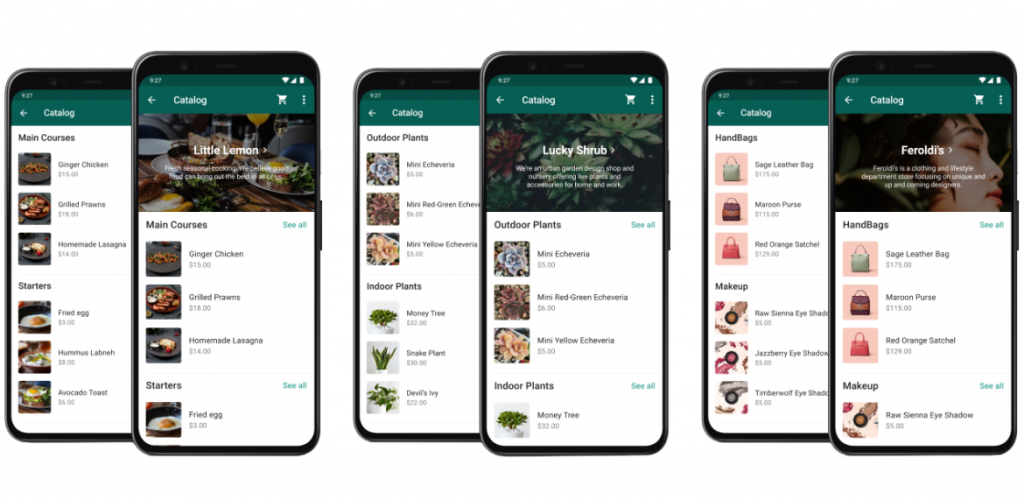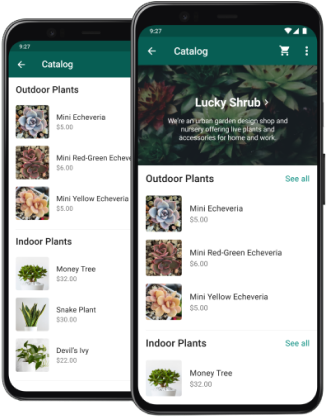WhatsApp Business API for E-Commerce – Market, Sell, and Support in a Single Platform

When it comes to e-commerce, the business case for the WhatsApp Business Platform (API) as a customer communication channel is too strong to ignore. E-Commerce sales are growing exponentially. The global ecommerce market is expected to total $6.3 trillion in 2023 and account for 21.2% of total retail sales as customers increasingly become comfortable with shopping online. Competition is also heating up as more players join in to get a share of the pie. With customers having choices aplenty when it comes to product offerings, CX is quickly becoming the key differentiator for brands looking to gain their customers’ loyalty. E-commerce brands are trying to create unmatched customer experiences and offer customers next-level ease and convenience across their purchase journeys. To gain a larger share of their customers’ wallets, even the most conventional businesses are pivoting to create a digital presence and meet customers “where they are”. They are investing in channels that offer customers both convenience and connection. WhatsApp, which offers both and more, is a natural choice.
E-commerce leaders that have adopted WhatsApp have been able to rapidly automate, scale and deploy messaging services for their customers and are seeing significant increases in lead conversion, daily orders, repeat purchases, and customer inquiries coming in through this channel. They have found WhatsApp to be seamless, efficient, and convenient.
However, when we talk of WhatsApp’s role in supporting e-commerce, a distinction needs to be made between the WhatsApp Business app and the WhatsApp Business API.
What is the WhatsApp Business API and How Is It Better than WhatsApp Business App in Supporting E-Commerce Needs?
WhatsApp Business has two different products – the Business App and the Business Platform (API). The WhatsApp Business app is a free-to-download tool that serves the needs of smaller e-commerce brands with maybe only a hundred customers or so. It’s unsuitable for larger businesses because of a number of reasons:
- Messages can be sent only to 256 contacts at one time
- The business can be linked only via mobile number, not a toll-free or landline number
- You cannot send dynamic links or CTA buttons
- Your customers need to have your number saved on their phones
- It lacks integration with other enterprise systems like your CRM or e-commerce site, so you cannot automatically send order updates, delivery statuses, and timely reminders to customers; you need to do it manually.
These limitations can be overcome with the use of WhatsApp Business API, an application programming interface provided by Meta that businesses can integrate into their existing infrastructure, like CRM tools, customer support solutions, and marketing platforms. The API has a set of codes that enable businesses to send and receive messages to customers on WhatsApp. They have some key advantages over WhatsApp Business app when it comes to e-commerce. With the API, you can:
- Have a verified business account and a branded profile
- Message an unlimited number of contacts
- Send thousands of outbound message notifications and self-service related information with a click of a button
- Connect bots of any complexity level
- Message customers even if they don’t have your number saved on their phones
- Have access to all messaging statistics
The WhatsApp e-commerce integration is a boon for brands as it helps them meet their customers’ needs comprehensively on WhatsApp itself. To access the API, you need to go via WhatsApp’s official partners like edna, which provides a platform with a simple and user-friendly interface to help your business manage customer communication over this channel. Learn more about edna here
WhatsApp Statistics Every E-Commerce Brand Should Take Note Of!
A recent Gartner study estimates that by 2025, 80 percent of customer service organizations will abandon native mobile apps in favour of messaging on third-party systems.
What Makes WhatsApp API Compelling for E-Commerce?
Lead Conversion Capabilities
Product discovery almost always happens online now and customers visiting a brand’s website or social media page invariably have questions they want clarified before they can decide on a purchase. Many people click on “chat with us” WhatsApp widgets on a brand’s website, or click on “Click to Chat” ads on social media platforms to be redirected to WhatsApp, where they can chat with agents or bots to get answers to product-related questions. In fact, as per Spectrm’s “The State of WhatsApp Business Messaging” report, 66 percent customers made purchases after communicating with a brand on WhatsApp. In the process, they also get added to the company’s customer database for future follow-up.
Personalized Customer Engagement
Personalization is a top strategic priority for all e-commerce brands now. Not only does it increase their customer base, it also boosts share-of-wallet among existing customers. WhatsApp’s great value proposition is that it helps brands personalize their customer communication at scale. It’s a highly convenient channel for offering consultations as well as shopping assistance, not to mention personalized discounts customers always appreciate.
WhatsApp bots or support agents can act as personal shopping assistants and:
- Recommend products based on their customers’ preferences
- Check for product availability
- Inform customers when unavailable items are back in stock
- Offer exclusive deals
- Share shipping details
- Make it easy to reorder favourite products
- Send replenishment notifications
- Update customers on loyalty point credits
- Make coupon redemption pain-free
- Share payment links
- Ensure pain-free returns and refunds
Relationship Nurturing for Increased Retention
It is well-known that the cost of acquiring new customers is almost five times higher than that of retaining existing customers. WhatsApp offers e-commerce brands an opportunity to stay connected with customers beyond a one-time sale and forge meaningful, ongoing engagement that creates long-lasting relationships and boosts customer lifetime value. It helps brands create an emotional connection with customers and keep conversations going even when the customer isn’t actively looking for a product. Brands can remain top-of-mind of customers by:
- Sending greetings and discount coupons on customers’ birthdays and anniversaries
- Surprising customers with freebies
- Inviting them to exclusive product launch events with ongoing promotions and updates
- Retargeting customers who have not made purchases lately with special offers
Upselling and Cross-selling
WhatsApp is a great place for e-commerce brands to increase order value of customers by cross-selling and up-selling. It can showcase products that are often purchased alongside the one the customer has added to their cart. It can even recommend additional products in the messages it sends to confirm transactions. Also, if a customer purchases some item, say a smartphone, from the brand’s e-shop, the Whatsapp API can detect that and send him a recommendation for a phone case – making a perfectly timed upsale. When your business uses WhatsApp, upsale and cross sale can become really easy.
Addressing Cart Abandonment Issues
Cart abandonment, fairly common among e-shoppers, is a leading cause of lost revenues for all e-commerce businesses. As per research by Baymard Institute, card abandonment rates are as high as 70 percent. One of WhatsApp’s many superpowers is that it can help to mitigate the adverse impact of abandoned carts by re-engaging the same customers and nudging them to make a purchase. Some WhatsApp best practices to reduce cart abandonment are:
- Reminding them that they may have simply forgotten to checkout
- Offering first-time customers free shipping in case they have quit because they found the shipping cost to be prohibitive
- Offer existing customers cross-sell suggestions they can add to their cart to meet the free shipping threshold
- Clear customer confusion regarding purchases over chat
- Identify customer issues by way of conversations
Integrations With Other E-Commerce Tools
The WhatsApp Business Platform can easily integrate with legacy systems like CRM, ticketing systems other valuable tools like Shopify, Mailchimp, Woocommerce, Magento, etc. This empowers your agents to unify communications and answer customer queries without having to switch from one system to the other. For instance, if you’re trying to help a customer in a WhatsApp chat and need to look at their refund status, you can access this information easily without keeping your customers waiting for long periods. Integration enables agents to have the full context of a customer’s issues so they can address them swiftly and reduce query handling times. Also, because all conversations are stored in the CRM, all support team members can access them and no matter which agent is assigned to chat with a customer, they have all the necessary context at hand.
Collection and Analysis of Valuable Customer Data
WhatsApp is a great place where your e-commerce brand can gather information from customers by way of conversations and use it to improve your products. You can learn more about your customers’ preferences and share more targeted products. Also, when you share links for reviews and ratings on WhatsApp, customers are more likely to respond. Agent interactions on WhatsApp can also shed light on the productivity of your contact center – how long it’s taking for agents to resolve customer queries, etc. – data that can help you make improvements to your processes.
Business-Friendly Features
To learn in details about the top 7 business-friendly features of WhatsApp Business API, read our blog – Top 7 WhatsApp Business API Features That Make It a Must-Have Tool for E-Commerce.


Image Credits: WhatsApp
WhatsApp’s Value Proposition at a Glance
Verified Business Accounts
98% Open Rates
40% Click-through Rates
Two-Way Communication
34% Message Response Rates
Integration with numerous back-end systems
Multi-agent access the Brand’s WhatsApp phone numbers
Different kinds of Conversations: Marketing, authentication, utility, service
How to Get Your Customers to Use WhatsApp Business API?
To be able to harness the full power of WhatsApp for your marketing, sales, and support activities, you need to first make customers aware of your presence on WhatsApp. This can be achieved via various gateways including:
- Click-to-Chat ads on Facebook, Instagram
- “WhatsApp Us” icon under your email signature
- WhatsApp Widgets on your website
- Phone IVR
Are There Any Limitations of WhatsApp API for E-Commerce?
The WhatsApp API does not allow video calling or voice calls as of now. Also, there are no native payments options available yet although Meta is working toward it.




![[photo]](https://edna.io/wp-content/themes/edna/images/authors/odelia-jacob.jpg)
![[icon]](https://edna.io/wp-content/themes/edna/images/authors/ico-linkedin.svg)